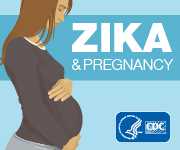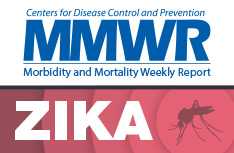Follow-Up Care
The prognosis for infants with congenital Zika virus infection is currently unknown. CDC’s infant guidance includes recommendations for testing infants for congenital Zika infection and clinical management recommendations for infants with evidence of Zika virus infection, both with and without apparent birth defects, to ensure careful screening and monitoring of infant development. For infants with congenital Zika virus infection, care is focused on diagnosing and managing conditions that are present, monitoring the child’s development over time, and addressing problems as they arise.
Long-Term Follow-Up Care for Infants with Congenital Zika Virus Infection
Infants with confirmed or probable congenital Zika virus infection should have a comprehensive ophthalmologic exam and hearing assessment by auditory brainstem response (ABR) testing before 1 month of age. Recommendations for follow up for these infants depend on whether they have abnormalities consistent with congenital Zika syndrome.
Infants with abnormalities consistent with congenital Zika syndrome (e.g., microcephaly, intracranial calcifications or other brain or eye abnormalities) require a multidisciplinary team and established medical home to facilitate the coordination of care. Before the infant’s discharge from the birth hospital, continued follow-up care with subspecialists and recommended services should be established.
- If not already initiated, neurology referral should occur for any abnormalities, including sleep problems and excessive irritability.
- If the newborn ophthalmology exam was normal, another exam (including retinal assessment) is recommended at age 3 months.
- If the newborn hearing screen was normal, an ABR should be performed at age 4–6 months.
- Infants with abnormal brain development can be at risk for hypothalamic dysfunction leading to pituitary insufficiency, and early manifestations of endocrine dysfunction might not be detected by routine newborn screening. Thyroid testing (TSH, free T3, and T4) should be performed at age 2 weeks and again at age 3 months. If either of these results is abnormal, further evaluation of pituitary function should be performed. Referral to a developmental specialist and early intervention services should occur as soon as possible.
Infants with laboratory evidence of Zika virus infection but without abnormalities consistent with congenital Zika syndrome should receive routine care including monitoring of head (occipitofrontal) circumference, length, and weight. Additionally, developmental monitoring should occur at every visit, and age-appropriate standardized validated developmental screening should occur at 9 months. A vision screening, including visual regard, should be performed at each well-child visit, and referral to an ophthalmologist should be made for any caregiver or provider concerns. Infants who passed an initial ABR should be referred for behavioral audiological diagnostic testing at age 9 months, or sooner for any hearing concerns.
Overall, families and caregivers of infants with congenital Zika virus infection will require ongoing psychosocial assessment and support. As a critical component of patient care and to facilitate early identification of developmental delays, families should be empowered to be active participants in their child’s monitoring and care.
Outpatient Management of Infant Hearing
The risk of a delayed onset or progressive hearing loss after an initial normal hearing screen in infants with congenital Zika virus infection is unknown.
Lab evidence of congenital infection AND (a) microcephaly OR (b) other findings consistent with congenital Zika syndrome
If the initial newborn hearing screen was performed using auditory brainstem response (ABR)
- Repeat ABR testing at age 4 to 6 months
- Refer to audiology for any abnormal findings or for any parental or provider concerns.
If the initial newborn hearing screen was performed using only otoacoustic emission (OAE)
- Refer the infant for ABR screening before 1 month of age.
- If hearing results are abnormal, refer to audiology as soon as possible
- If the newborn hearing screen was normal, arrange for an ABR to be performed at age 4 to 6 months.
Lab evidence of congenital infection but WITHOUT findings consistent with congenital Zika syndrome
- Perform auditory brainstem response within one month of birth.
- Consider repeat ABR at age 4 to 6 months or perform behavioral diagnostic testing at age 9 months.
- Refer to audiology for any abnormal findings or for any parental or provider concerns.
Infants with laboratory evidence of Zika virus infection but without apparent abnormalities at birth are recommended to have additional monitoring until further information is available regarding outcomes because some neurologic sequelae of congenital Zika virus infection (e.g., seizures, cognitive impairment, and vision and hearing abnormalities) might be subtle or have delayed onset.
Providers should also
- Refer infants with abnormalities on initial hearing screen to an audiologist for a complete evaluation.
- Consider ABR testing of infants at age 4 to 6 months, although the risk from sedation needs to be taken into account.
- Refer infants who (a) passed an initial ABR and (b) did not have an ABR at age 4 to 6 months for behavioral audiologic diagnostic testing at age 9 months or sooner for any hearing concerns. Behavioral audiologic testing is recommended because of the potential need for sedation with ABR testing in infants.
Follow-Up Care for Newborns Testing Negative for Zika Virus
In the absence of abnormal findings on examination, newborns with negative Zika tests who were born to mothers infected during pregnancy should receive routine pediatric care, including measurement of growth and development, and appropriate evaluation and follow-up care for any clinical findings that arise. If the newborn has abnormal findings on history or examination, diagnostic testing for other causes of the newborn’s conditions should be performed, including testing for other congenital viral infections if indicated.
A newborn born to a mother who had Zika virus infection during pregnancy meets criteria for reporting to the US Zika Pregnancy Registry and the Puerto Rico Zika Active Pregnancy Surveillance System. CDC requests that healthcare providers collect and report pertinent clinical information about these infants to their designated health department.
Patient Materials
What to Know if Your Baby Was Born with Congenital Zika Syndrome
What to Know if Your Baby May Have Been Affected by Zika but has No Related Health Conditions at Birth
Clinician Resources
Evaluation and Management for Infants with Possible Congenital Zika Infection
Assessment of Infant Hearing
More Information
- Vital Signs: Update on Zika Virus–Associated Birth Defects and Evaluation of All U.S. Infants with Congenital Zika Virus Exposure — U.S. Zika Pregnancy Registry, 2016
- Interim Guidance for the Evaluation and Management of Infants with Possible Congenital Zika Virus Infection – United States, August 2016 (MMWR, August 19, 2016)
- AAP: Zika-Related Psychosocial Support Resources
- Page last reviewed: August 29, 2017
- Page last updated: August 29, 2017
- Content source:





 ShareCompartir
ShareCompartir